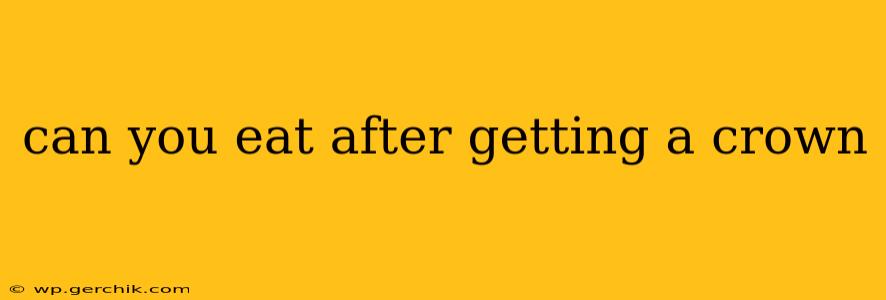Getting a dental crown is a significant procedure aimed at restoring a damaged tooth's structure and function. Naturally, a common question patients have is: "Can I eat after getting a crown?" The short answer is yes, but with important caveats. The immediate aftermath of crown placement requires careful consideration of your diet to ensure the success of the procedure and prevent complications. This guide will delve into the details, answering frequently asked questions and providing essential advice.
What Can I Eat Right After Getting a Crown?
Immediately following the procedure, you'll likely experience some numbness from the local anesthetic. Until this wears off, it's crucial to avoid eating or drinking anything hot or cold to prevent accidental burns or discomfort. Stick to soft, lukewarm foods and liquids. Think:
- Smoothies: Nutritious and easy to consume.
- Applesauce: Gentle on the gums and teeth.
- Yogurt: Provides protein and is easily digestible.
- Mashed potatoes: Soft and avoids putting pressure on the newly placed crown.
- Oatmeal: A warm, comforting, and easy-to-chew option.
What Foods Should I Avoid After Getting a Crown?
For at least 24 hours, and ideally longer, steer clear of these foods:
- Hard, crunchy foods: These can dislodge the crown or damage the cement. Examples include nuts, hard candies, ice, popcorn, and chips.
- Sticky, chewy foods: These can pull at the crown and compromise its stability. Examples include caramel, taffy, gummy bears, and chewing gum.
- Tough, fibrous foods: These require significant chewing and can put excessive pressure on the crown. Examples include steak, raw carrots, and celery.
- Extremely hot or cold foods and drinks: These can cause sensitivity in the treated tooth.
How Long Should I Wait Before Eating Normal Foods After Crown Placement?
The waiting period before resuming your normal diet depends on several factors, including the type of crown, the condition of your tooth, and your dentist's specific instructions. While soft foods are recommended in the initial 24 hours, your dentist will likely advise you on when it's safe to gradually reintroduce firmer foods. Typically, it takes several days to a week before you can comfortably eat most foods without restriction. However, always listen to your body – if something feels uncomfortable, avoid it.
What If I Bite Down and Feel Pain or Discomfort?
If you experience pain, discomfort, or any unusual sensation after biting down, contact your dentist immediately. This could indicate a problem with the crown's fit or cementation. Prompt attention can prevent further complications.
Can I Eat After Getting a Temporary Crown?
Temporary crowns are less durable than permanent crowns and require even more caution. The same principles apply, avoiding hard, sticky, and chewy foods. Because temporary crowns are more susceptible to damage, it's crucial to follow your dentist's dietary recommendations closely.
What are the risks if I don't follow the dietary recommendations?
Ignoring post-crown placement dietary advice increases the risk of the following complications:
- Crown dislodgement: Hard or sticky foods can dislodge the crown, necessitating another visit to the dentist.
- Cement failure: Excessive chewing forces can cause the cement holding the crown in place to fail.
- Tooth damage: Uneven chewing forces due to a poorly fitted or dislodged crown can lead to damage of the underlying tooth.
- Infection: Food particles trapped under a dislodged crown can lead to infection.
Following your dentist's instructions carefully is crucial for the longevity and success of your dental crown. Patience and a few days of dietary adjustments will greatly improve the chances of a positive outcome. Remember to contact your dentist if you have any concerns or experience any complications.
